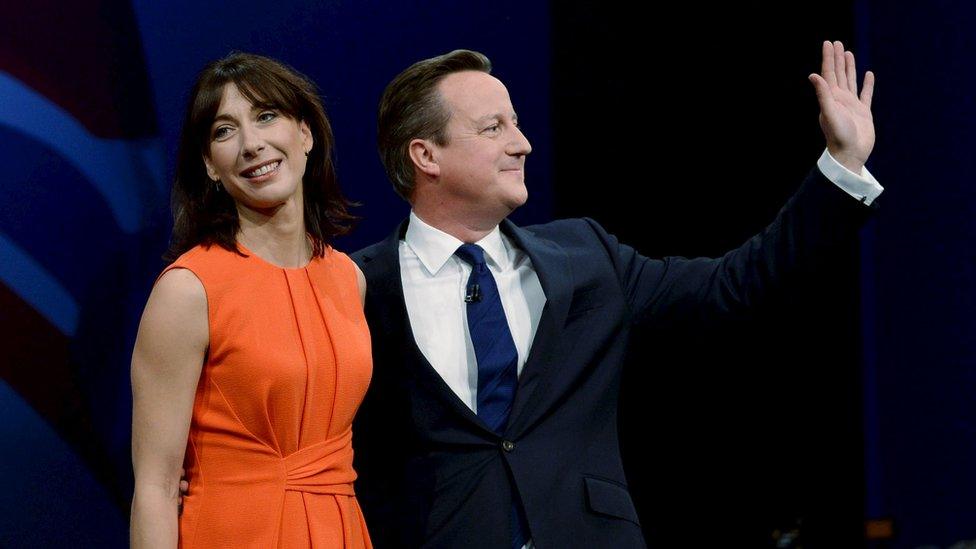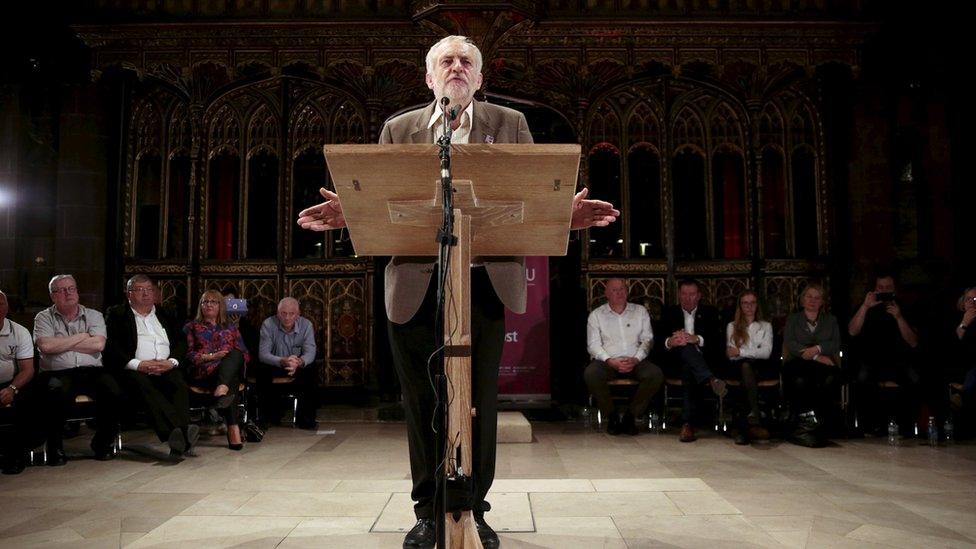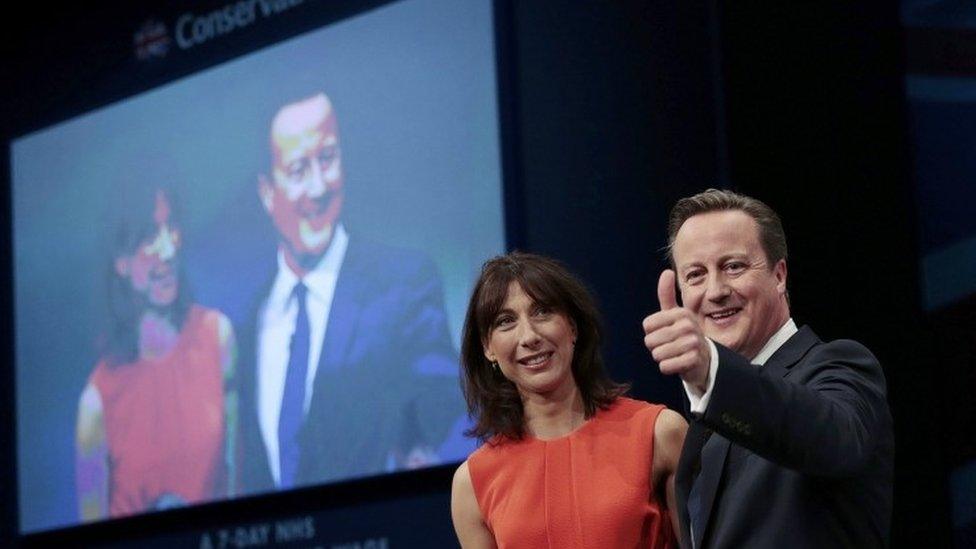The triumphant flight of the lame duck
- Published

David Cameron's self-harm, turning himself into a lame duck with just one shot to the foot, does not stop him from flapping serenely into the future. The quacking squabbles from the pond below do not yet spoil his serenity.
The prime minister's speech acknowledged that the end is nigh.
This speech was not an epilogue, but we do know we are flicking towards the final chapter, even if the denouement is a way off yet.
This sense of finality is an odd thought so soon after an election victory, but it is a fact after Mr Cameron's kitchen confessional that 2020 will see him max the chillax.
It doesn't just mean we all know he won't be leading his party into the next election. More importantly the person who will be leading the party and potentially the country knows that too.
Hence all the histrionic auditions.
As ministers spoke this week, their eyes were on the prize. And take no heed of the dodo, external in Alice's Adventures in Wonderland, for the UK does not caucus, and not all will win prizes.
Luck, accident and the unexpected will all play a part, but two Es, will dictate the next leader: Europe and the economy.

Leadership pitches at Tory conference?
George Osborne - the Chancellor is the bookies' favourite, his conference speech described a "new centre ground"
Boris Johnson - called for a "united society" to protect the low-paid, in a speech packed with jokes that attempted to show what he had delivered in his time as Mayor of London
Theresa May - the Home Secretary gave a hard-line speech on immigration, seen as an attempt to put herself back on the map
Sajid Javid - the Business Secretary defended the government's trade union reforms
Philip Hammond - the Foreign Secretary warned the prime minister would find it "very, very difficult", external to secure any reforms to EU freedom of movement rules
Michael Gove - the Justice Secretary pledged to bring a "reforming zeal" to the prison system, external
Jeremy Hunt - the Health Secretary continued his push for seven-day NHS services in England, but also caused controversy after suggesting tax credit cuts would motivate Britons to work as hard as people in China
Nicky Morgan - the Education Secretary, who has said she is considering running for the leadership, told the conference that parents in England would be given the right to request their school provides childcare for a full working day

May's 'eau de mauvais'
Theresa May: "Humane for those who need our help, tough on those who abuse it"
Each of the candidates has a luxurious four or so years to set out their stall.
This could well end badly, with divisions and infighting - but, for the moment, it is a potential advantage for the prime minister and his party.
For now, Mr Cameron can afford to allow his successors to sprawl incontinently across the centre ground, offering a post-modern dominance, occupying in appearance all available territory, in reality a slightly different take on what the Conservative Party means.
Theresa May hasn't exactly apologised for once suggesting long ago that the Tories had to change their image as the nasty party, external, but she seemed to have given herself a good spray of "eau de mauvais" before her speech.
Many in the party, who will make the final decision on their next leader, love a whiff of toughness that verges on harsh.
Boris's bloke power
Boris Johnson hardened his position on Europe and ever so slightly tilted to the left, external on behalf of hard-working families, but the positioning is rather more about the chancellor and rather less about the left-right spectrum.
Really his appeal is not about policy but jokes. I don't write that dismissively but in admiration that his chutzpah appears to pay off. The appeal of Boris is profound. Not in ideas but in whizz and bang, fizz and pop.
Boris Johnson's joke comparing his policies to a rugby scrum went down well with delegates
During the election, one man told me he could vote for Boris because he'd been to an ordinary school, not like Ed Miliband.
It wasn't that this Yorkshire taxi driver thought Eton more ordinary than a comprehensive, but because Boris has bloke power. He's the "Crikey, what a hole! Man the life boats! Seize this thing by the scruff of the neck" candidate.
He is most definitely not the candidate of steady-as-she-goes stability and continuity.
That would be the chancellor.
Osborne - Thatcher's heir?
It is neither original nor clever to say that George Osborne is the most interesting politician around at the moment. Yet it doesn't prevent it being true.
His speech was an audacious melange of left, right and centre that took triangulation to new daring levels, the political equivalent of egg-and-bacon ice cream.
Much more ideological than his relaxed friend next door, he wants to reduce the power of the state in ways Mrs Thatcher did not dare.
But this is cloaked in Labour's language. He doesn't just pinch some of Labour's rhetoric and aims, but some of their ideas too.
It's not just fizz and pop either - he does seem to believe in devolution and, more strangely still, using the power of the state to develop infrastructure projects in a way that his recent host in China, external might applaud.
Odder still, I have Labour-voting friends who hate our rather consensual one-nation Tory prime minister, but grudgingly admire the adamant Thatcherite chancellor.
Gambling on Europe
However, Europe could do for almost gorgeous George.
Of course if Mr Cameron fought and lost a referendum to stay in the European Union, he would have to resign.
But George Osborne plans to play a leading part too. And while he might keep his job after a defeat, his ambitions would not be left intact.
What Boris and Theresa May do is vital. My instinct is that he is a gambler and not a team player, but to oppose the prime minister would be too big a risk even for him.
Mrs May is not a gambler nor a revolutionary but could clean up in sorrow rather than anger after a euro defeat.
Opposition and the economy

Jeremy Corbyn spoke at a rally organised by the Communication Workers Union at Manchester Cathedral while the Conservative conference continued
Then there's the economy.
In Conservative minds, the contest for the leadership is an almost automatic key to Number 10. They just don't see Jeremy Corbyn as a serious contender for the job.
The near universal belief of Conservatives and the commentators may be very mistaken.
I suspect they could well have misjudged the depth of enthusiasm for something different, an enthusiasm for anti-establishment radicalism, which genuinely seems to have passed them by.
But it exists and may well help Mr Corbyn cement his leadership. However, it is hard to argue that the Westminster consensus is wrong about the looming trauma for the Labour Party, the serious divisions over policy that could lead to a diminution in electoral appeal.
But all bets are off if the economy takes another tumble. If all the chancellor's policies seem to have failed, then Labour will be in with a chance, whoever their leader.
Then the Conservatives might prefer charisma to clever.
But it is probably Europe that will matter more. The prime minister's risky renegotiation will dictate the fate of the EU, the UK - and his chancellor.
- Published7 October 2015

- Published7 October 2015
- Published6 October 2015